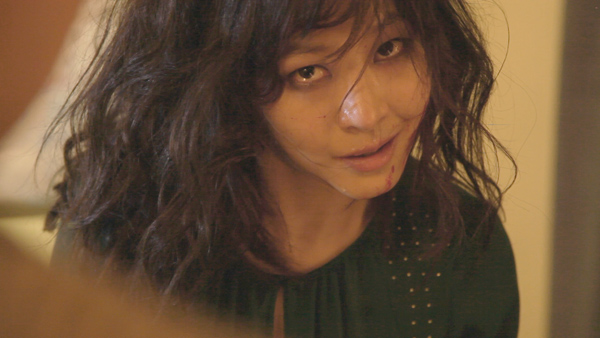“What is family? What are desires? What are genitals?” These are the opening statements of director Kim Ki-duk in the press notes for this Korean enfant terrible’s most extreme provocation yet, the gloriously grotesque, magnificently mad Moebius. Those three questions succinctly encapsulate the themes of his latest feature, which is without a doubt his most astonishingly shocking. And that’s really saying something for the director of The Isle, which notoriously featured the use of fishhooks well beyond their intended purpose, and which reportedly caused vomiting among spectators at its Venice Film Festival screenings. Moebius, not incidentally, inspired some of those same reactions among its first audiences last year, also at Venice.
The real-life symmetry of reactions to those two films mirrors the structure of Moebius, which, appropriately to its title, makes use of repetition and symmetrical scenes that depict the actions of the very twisted family at its center. Much like the titular strip, the violence, betrayal, pleasures, and pain experienced represent a continuous loop that isn’t broken until the very end.
As violently intense as many of Kim’s films are, one aspect that is rather less discussed is how their scenarios often teeter on the edge of risible absurdity. Moebius sees Kim fully embracing the farcical elements of his sensibility to create his first out-and-out comedy. Yes, it’s an exceedingly pitch-dark comedy, one that involves castration, self-mutilation, gang rape, and incest, but it’s a comedy nonetheless.
More than that, Moebius is a silent comedy. Not one word of dialog is uttered by anyone. Rather than the gimmick or pretentious affectation this stylistic gesture would be in lesser hands, this emphasizes the elemental and primal qualities of the family and their actions. It also represents a logical progression from his previous films, which often feature taciturn or completely non-verbal characters. Adding to the film’s primitive nature is that none of his characters are given a name.
The film wastes no time whatsoever with its jaw-dropping and awe-inducing audaciousness. In an atmosphere that is palpably tense from the very first frame, Father (Cho Jae-hyun) gets a call from the woman he’s having an affair with. Mother (Lee Eun-woo) knows exactly who the call is from, and she attempts to wrestle the phone out of his hand. They have a protracted fight over the phone and end up on the ground during their struggle. Meanwhile, the Son (Seo Young-ju) regards his parents’ fight with a rather jaded indifference.
Father wins back the phone and goes outside on the terrace to take the call while Mother seethes in anger. Father then leaves the house to see his mistress, fending off Mother’s attempts to keep him from leaving. Father meets his lover, the Young Woman (Lee Eun-woo again), and they have sex in his car. Unbeknownst to them, Mother has followed them and has been watching them from a distance.
Back at home, Mother decides to take drastic action to end her husband’s infidelity once and for all. She grabs a knife hidden underneath a bust of Buddha, and goes to the bedroom where Father is sleeping, intending to castrate him. But Father wakes up and fights her off, throwing her out of the room and locking the door. Her plan thwarted, but still in the throes of extreme anger, she decides to castrate her son instead, after she spies on him masturbating.
One of the great pleasures of Moebius is in watching Kim continually top himself in outrageousness and in taking his story to deliriously outlandish heights. The film can be fruitfully read as a wicked satire of patriarchy and phallocracy, one which builds to violent climax worthy of Greek tragedy. As unhinged and wildly chaotic as the action may seem, Kim’s assured and masterful authorial hand is abundantly evident throughout. As director, screenwriter, cinematographer and editor, Kim employs a raw yet starkly beautiful aesthetic that lends a visceral immediacy and intimacy to the proceedings.
Contributing greatly to this effect are the excellent performances, made even more impressive by conveying emotion without recourse to dialog. Kim regular Cho Jae-hyun, who delivered fine performances in Kim’s Bad Guy and Address Unknown, adds to this gallery of memorable roles, eliciting sympathy for his deeply flawed character. In addition, Seo Young-ju intensely renders the anguish of the innocent caught in the war between his parents.
However, as impressive as the other principal actors are, the real stunner is Lee Eun-woo, who delivers tour de force performances in her dual role. She so convincingly plays two different characters that it wasn’t until the end credits that I became fully aware that both parts were indeed portrayed by the same actress. Though Moebius is preoccupied with the struggles and anguish of the male characters, it’s really Lee’s roles that are the compelling heart of the film.







Leave A Comment